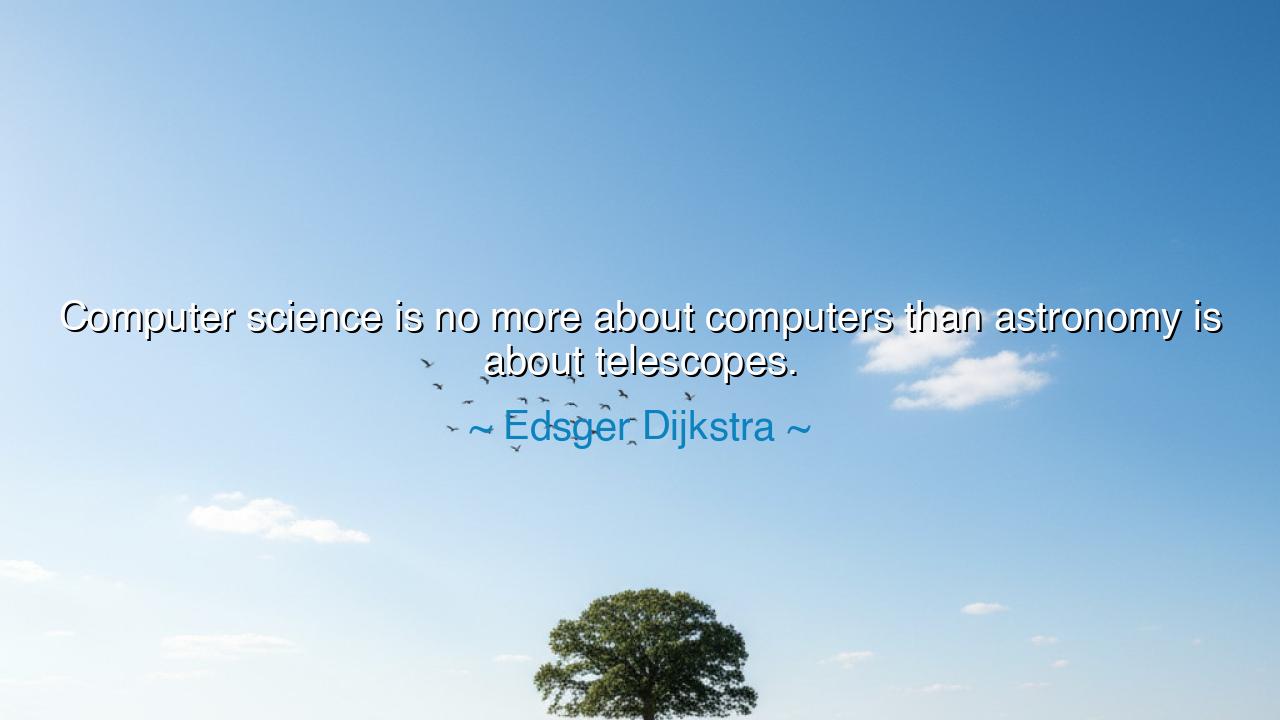
Computer science is no more about computers than astronomy is






Edsger Dijkstra’s words, “Computer science is no more about computers than astronomy is about telescopes,” carry within them a profound insight into the very nature of knowledge and its relationship to the tools we use to explore it. Dijkstra, one of the greatest minds in the field of computer science, reminds us that the study of computer science is not merely about the machines we use to process information, but about the underlying principles that govern how those machines operate. It is about logic, algorithms, and the mathematical structures that form the foundation of computation—much in the same way that astronomy is not solely about telescopes, but about the study of the universe, the laws of nature, and the celestial bodies that inhabit it.
This insight echoes the wisdom of the ancients, who knew that the tools we use are but extensions of our minds—they are not the end in themselves, but the means by which we understand and interact with the world. The great philosophers of ancient Greece, such as Aristotle, were not concerned with the mere tools of observation; rather, they sought the underlying principles that governed the world. Just as astronomy is about understanding the stars and the cosmos, rather than simply observing them through a telescope, so computer science is about understanding the principles of computation, the abstract structures, and the logical frameworks that define it. The computer itself is merely a tool for realizing those principles, much like the telescope is for revealing the mysteries of the universe.
In the ancient world, mathematics was seen as the language of the cosmos, and those who could understand its secrets were often revered as possessing a divine knowledge. Euclid, the great Greek mathematician, was not merely concerned with the tools of measurement; he sought to understand the fundamental truths that governed the relationships between shapes and numbers. Similarly, Pythagoras and his followers understood that numbers were not just symbols, but the very structure of the universe. The tools—whether a compass or a protractor—were but means to unlock the hidden patterns of the world. Dijkstra’s quote reflects a similar understanding: that computer science is not about the machine itself, but about the abstract principles that can be applied to any computational device.
Consider the story of Isaac Newton, whose work laid the foundation for modern physics. Newton’s genius was not in the tools he used—though his telescope and instruments were essential to his work—but in his insight into the laws of motion and gravity. Newton didn’t just look through a telescope and record observations; he sought the principles that explained why things moved the way they did. In much the same way, computer scientists do not simply program machines to execute commands—they explore the deeper structures of computation, looking for patterns and principles that can be applied across all technologies. The machine is the tool, but the understanding of computation is the goal.
Dijkstra’s insight is also a reminder that the study of technology and science is not just about mastering tools, but about mastering thought itself. When astronomers look through a telescope, they do not merely observe; they interpret and analyze the data they receive to gain a deeper understanding of the universe. Likewise, the computer scientist uses the computer not merely as a tool to perform tasks, but as a means to explore the abstract world of algorithms, data structures, and logical reasoning. The machine is a tool of exploration, but the true discovery comes from understanding how it can be used to solve problems and reveal truths about the world.
This distinction is crucial, for it speaks to the heart of the human journey. The tools we create—whether telescopes, computers, or instruments of measurement—are extensions of our desire to understand the world. But understanding is not about the tools themselves. The tools are merely the means to engage with the world and the universe in ways that are beyond our immediate capacity. The ancients used the astrolabe to navigate the seas and the stars, but it was not the instrument that made them great—it was their vision and understanding of the stars and the universe that guided them. In the same way, computer science is about understanding the principles of computation and using the tools of technology to unlock deeper insights into the structure of information and knowledge.
Lesson for the ages:
True understanding lies not in the tools we use, but in the principles we uncover. Just as the ancients understood that the stars were governed by laws beyond their immediate perception, we must recognize that technology and computer science are not about mastering machines, but about mastering the abstract principles that drive them. The tools are merely vehicles for human understanding, and it is the mind—not the machine—that remains the ultimate source of knowledge and insight.
Practical Action:
As you engage with the world of technology, remember that the computer is but a tool—a means to an end, not the end itself. Seek to understand the deeper principles that govern how computers work and how they can be used to solve problems. Focus not just on learning how to use the tools, but on understanding the logic, mathematics, and abstract structures that define them. Like the ancients, who sought the universal truths behind their tools and discoveries, let your journey in computer science be one of deep understanding, not just surface mastery. In this way, you will not just use the machine, but transcend it, and gain wisdom that will endure.






AAdministratorAdministrator
Welcome, honored guests. Please leave a comment, we will respond soon